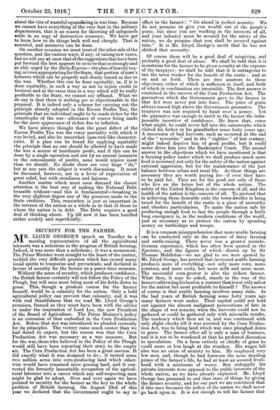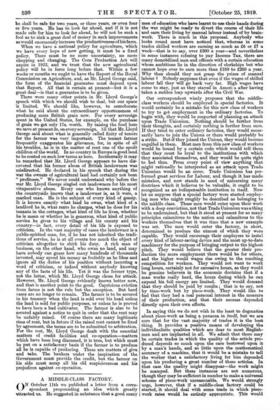SECURITY FOR DIE FARMER.
MR. LLOYD GEORGE'S speech on Tuesday to a meeting representative of all the agricultural interests was a milestone in the progress of British farming. Indeed, it was more than a milestone ; it was a monument. The Prime Minister went straight to the heart of the matter, tackled the very difficult question which has caused many timid spirits to temporize and prevaricate, and declared in favour of security for the farmer as a peace-time measure. Without the sense of security, which produces confidence, the British farmer certainly will not follow the Policy of the Plough, but will once more bring most of his fields down to grass. This, though a prudent course for the farmer himself, would be a calamity for the nation. Only a bold agricultural policy can prevent that calamity, and it was with real thankfulness that we read Mr. Lloyd George's promises, framed as they must have been with the advice or under the inspiration of Lord Lee, the new President of the Board of Agriculture. The Prime Minister's policy is an extension of that embodied in the Corn Production Act. Before that Act was introduced we pleaded earnestly for its principles. The victory came much sooner than we had dared to expect, but the reason was that the Corn Production Act was necessary as a war measure. But for the war, those who believed in the Policy of the Plough would still have been repeating their story to the empty air. The Corn Production Act has been a great success. It did exactly what it was designed to do ; it turned some two million acres into corn-producing land which otherwise would have remained mere grazing land, and it converted the formerly lamentable occupation of the agricultural labourer into a career which any self-respecting man might be glad to adopt. Over and over again we have pointed to security for the farmer as the key to the whole problem of British farming. On August 23rd of this Sear we declared that the Government ought to say in effect to the farmer : " Go ahead in perfect security. We do not promise to give you wealth out of the people's purse, but since you are working in the interests of all, and your industry must be secured for the safety of the nation, we do promise that you shall be secured against ruin." It is Mr. Lloyd George's merit that he has not shirked that necessity.
Of course there will be a good deal of misgiving, and probably a good deal of abuse. We shall be told that it it monstrous for the farmer to be given security at the expense of the taxpayer; we shall be told that it is outrageous to tax the town worker for the benefit of the rustic ; and so on and so forth. There are two answers to these objections, either of which is sufficient in itself, and both of which in combination are irresistible. The first answer is contained in the success of the Corn Production Act. The guarantees which the Government gave to the farmer in that Act were never put into force. The price of grain always soared high above the Government guarantee. The taxpayer was not required to hand over a penny. Yet the guarantee was enough to instil in the farmer the indispensable incentive of confidence. He knew that, come what might, he could never fall into the catastrophe which visited his father or his grandfather some forty years ago. A succession of bad harvests, such as occurred at the end of the " seventies " and in the " eighties " of last century, might indeed deprive him of good profits, but it could never drive him into the Bankruptcy Court. The second answer to the objections which we have mentioned is that a farming policy under which we shall produce much more food is necessary not only for the safety of the nation against external aggression, but for the maintenance of the just balance between urban and rural life. As these things are necessary they are worth paying for—if ever they have to be paid for. They are for the good not only of those who live on the farms but of the whole nation. The safety of the United Kingdom is the concern of all, and the health of the nation is the concern of all. To pretend that in achieving these desirable ends the town-dweller is being taxed for the benefit of the rustic is a piece of unworthy and obsolete particularism. To make the nation safe by producing enough food to last the people through a fairly long emergency is, in the modern conditions of the world, just as necessary as to protect the nation by spending money on battleships and troops.
It is a common misapprehension that more arable farming can be conducted only at the expense of dairy farming and cattle-raising. There never was a greater mistake. German experience, which has often been quoted in the Spectator, and the figures of which—drawn up by Sir Thomas Middleton—we are glad to see were quoted by Mr. Lloyd George, has proved that increased arable farming produces more of everything—not only more corn, more potatoes, and more roots, but more milk and more meat. The successful corn-grower is also the richest farmer. What then, it may be asked, stands in the way of the farmer cultivating his land in a manner that is not only safest for the nation but most profitable to himself ? The answer of course is that arable farming involves many risks. In the bad years of British farming some forty years ago many farmers went under. Their capital could not hold out against the almost malignant persecutions of fate in the shape of wet seasons, when the harvests could not be gathered or could be gathered only with miserable results. The tendency which then set in, and was continued with only slight checks till it was arrested by the Corn Production Act, was to bring land which was once ploughed down to grass. The farmer after all is only a man of business, and it is not to be wondered at that he preferred discretion to speculation. On a farm entirely or chiefly of grass he could more or less laugh at the weather. His wages bill also was no cause of anxiety to him. He employed very few men, and, though he had forsworn the more dazzling prizes of the farmer's life, he had at least an assured livelihood with a minimum of worry. But unhappily his private interests were opposed to the public interests of the whole nation, as we have already explained. Mr. Lloyd George has promised to end that state of things by giving the farmer security, and for our part we are convinced that if this once becomes the policy of the nation we shall never go back upon it. It is not enough to tell the farmer that he, shall be safe for two years, or three years, or-even four or five years. He has to look far ahead, and if it is not made safe for him to look far ahead, he will not be such a fool as to sink a great deal of money in such improvements as would enormously increase the productiveness of his farm. When we have a national policy for agriculture, which we have every hope of now getting, it must be a fixed policy. There must be no more uncertainty, no more chopping and changing. The Corn Production Act will expire in 1922, and we trust that the new agricultural policy will be in force long before that. Within a few weeks or months we ought to have the Report of the Royal Commission on Agriculture, and, as Mr. Lloyd George said, the form of the financial guarantee must depend upon that Report. All that is certain at present—but it is a great deal—is that a guarantee is to be given.
There were many other points . in Mr. Lloyd George's speech with which we should wish to deal, but our space Is limited. We should like, however, to corroborate what he said about the extraordinary opportuneness of producing more British grain now. For every sovereign spent in the United States, for example, on the purchase of grain we get only. 17s. worth. By raising the food here we save at present 3s. on every sovereign. All that Mr. Lloyd George said about what is generally called fixity of tenure for the fanner was very important. The tenant farmer frequently exaggerates his grievance, for, in spite of all his troubles, he is in the matter of rent one of the • spoilt children of the world: In-no country in Europe is,good land to be rented on stroll low terms as here. Incidentally it may be remarked that Mr. Lloyd George appears to have discovered that his former abuse of British landowners was misdirected. He declared in his speech that during the war the owners of agricultural land had certainly not bean " profiteers." We never could understand why before the war Mr. Lloyd George singled out landowners for his most vituperative abuse. Every one who knows anything of the countryside knows that a. landowner is, as it were, a marked man. He is the subject of every kind, of gossip. It is known exactly what land he owns, what kind of a landlord he is, what rents he charges, what he does for his tenants in the-cottages, what kind of life he lives, whether he is mean or whether he is generous, what kind of public service he gives to his village and his county and his country—in fact, every detail of his life is exposed to criticism. In the vast majority of cases the landowner is a public-spirited man, for, if he has not inherited the, traditions of service, he is at all events too much the object of criticism altogether to shirk his duty. A rich man of business, on the other hand, who owns no land, and may have nobody can guess how many hundreds of thousands invested, may spend his money as foolishly as he likes and ignore all the duties of his position without incurring a word of criticism, or indeed without anybody knowing any of the facts of his life. Yet it was the former type, not the latter, which Mr. Lloyd. George chose for attack. However, Mr. Lloyd George evidently knows better now, and that is another point to the good. Capricious eviction from farms is not •the rule but the exception. But hard cases are no longer to remain. The farmer is to be secured. in his tenancy when the land is sold over his head unless the land is sold for public purposes, or unless he is proved to have been a bad cultivator. The farmer is also to be secured against a notice to quit in order that the rent may be unfairly raised. Of course there are many legitimate rises of rent, but in future if the raised rent cannot be fixed by agreement, the terms are to be submitted to arbitration. For the rest, Mr. Lloyd George dealt with the essential matters of credit facilities and co-operation—matters which have been long discussed, it is true, but which must be put on a satisfactory basis if the farmer is to produce all he is capable of producing. These are matters of give and take. The bankers under the inspiration of the Government must provide the credit, but the farmer on his side must scrap all his old suspiciousness and his prejudices against co-operation.











































 Previous page
Previous page